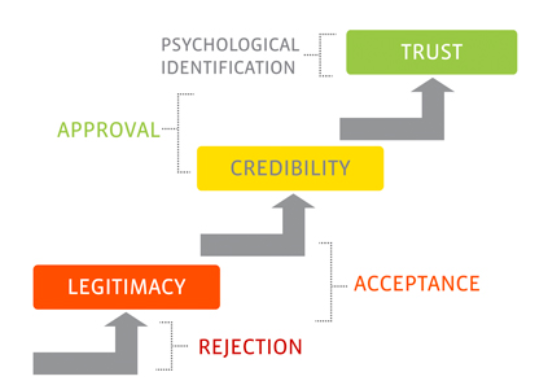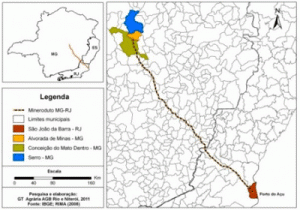In Last week’s post, there was a brief mention of Minas Rio, a giant iron ore mine being developed by Anglo American in the states of MInas Gerais and Rio de Janeiro en Brazil. The $ 16 billion project consists of the mine and beneficiation plant in Minas Gerais, a 525 KM pipeline which will carry the ore in a slurry to the sea and a brand new port facility located in the village of Açu. The project is a great example the concept of a Licence to Operate, that is increasingly important to doing business.
- Legal Issues

One part of the Licence to Operate is to obtain the legal permits to do business. In the case of Minas Rio, the original promotor, Brazilian entrepreneur Eike Batista, who sold the project to Anglo American for $5.5 Billion in 2007 , divided the legal process into four parts, one for each of the three parts of the project and another for the 90 KM power line that the company had to build to bring electrical power to the mine.
In the Brazilian system, each of the four projects needed a preliminary permit to begin feasibility studies, a second permit for project construction and a third permit to begin operation. While the mine and transmission line is under the jurisdiction of Minas Gerais, a nominally pro-business state with a long history of heavy mining activities, the port is located in the Rio De Janeiro and the pipeline falls under a federal agency as it crosses state lines.
Although the project was delayed for much of 2012 due to legal injunctions connected with the permit for the transmission line and the discovery of archeological artefacts on the site, it appears that the operational licences are expected to be granted in the next couple of weeks and the mine should start shipping iron ore to China before the end of the year.
- Social issues
While the legal Licence to Operate is critically important, in the mining industry it is common to also talk about the social Licence to Operate which can be even more critical.
Ian Thompson, a Canadian consultant structures the process of obtaining a social license to operate coming from legitimacy to credibility to trust, as shown below.
In building a strong reputation, a firm must first establish its legitimacy by securing all of the relevant permits and legalities and also establishing some forms of communication with different stakeholders. This will lead to a firm being at least accepted. For real approval, however, credibility is needed which can only be built over time and Thompson distinguishes between technical and social credibility. Credibility, in essence has to do with providing reliable information, honoring commitments and acting in a consistent and responsible manner. For Thompson, the final level, trust, can only happen by creating common or shared experiences between a company and the community around it and that this will potentially create a psychological identification with the firm.
- Small town politics
Minas Rio will directly employ about 1,500 people but has already changed the nature of the small towns near the mining site. More than 20,000 construction workers have been involved in the entire project and they not only bring huge amounts of money into communities but also noise, heavy trucks, and social problems.
Apart from the 1,500 property owners affected by the pipeline, about 85 families were re-located from the main mining site and tailing dam area and all of this was managed by a dedicated social outreach team and backed up by legal and financial specialists.
In the end, Anglo American, has spent hundreds of millions of dollars on a wide variety of projects including rebuilding damaged roads and building new hospitals, clinics, schools and even police stations of the communities which have been impacted by the project.
The team uses Anglo’s Socio-Economic Assessment Toolbox (SEAT) and its approach, and the completion of most of the promised projects is largely credited with he high degree of social peace that it has achieved to date.
The critical thing about the social licence to operate is that it takes time, money, and energy to build acceptance but it can be lost very quickly in the case of catastrophic accidents or more mundane cases of neglecting the opinion of local stakeholders.



